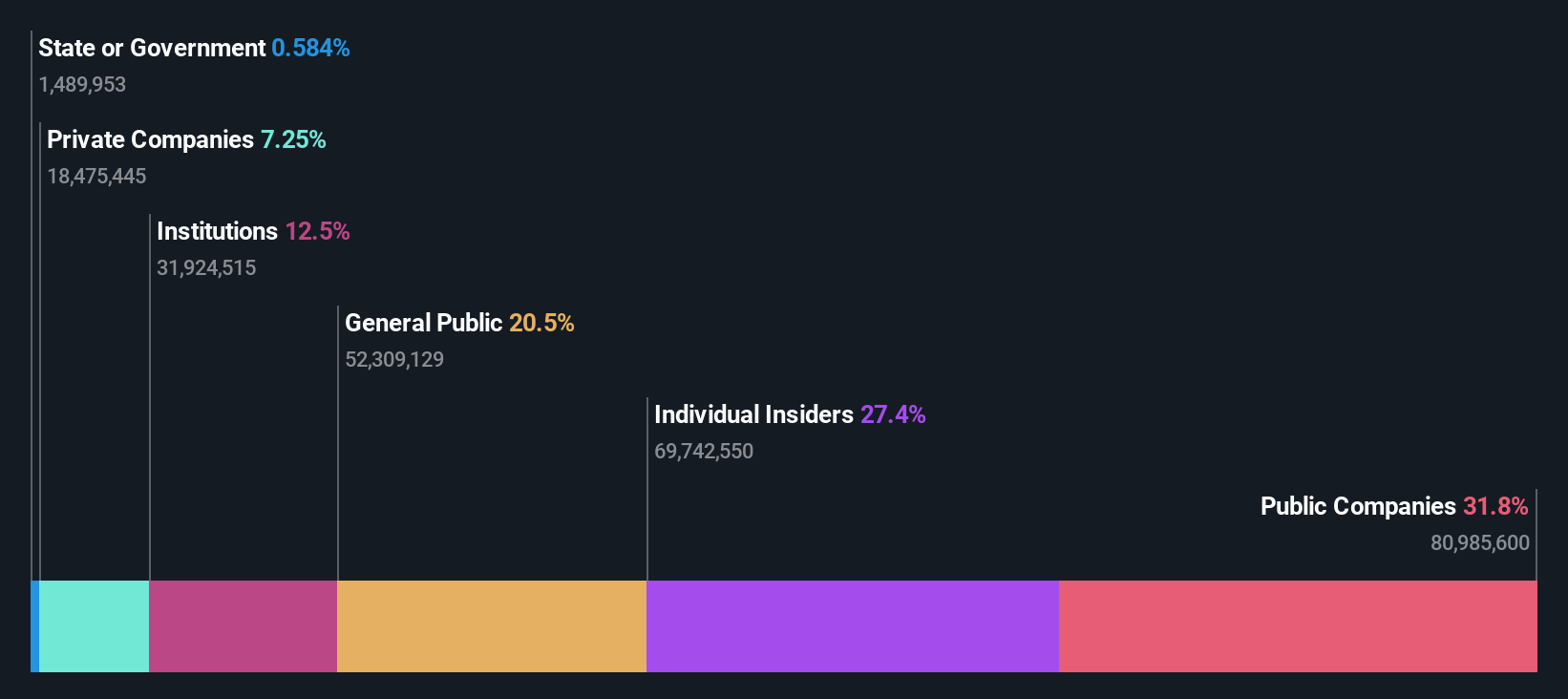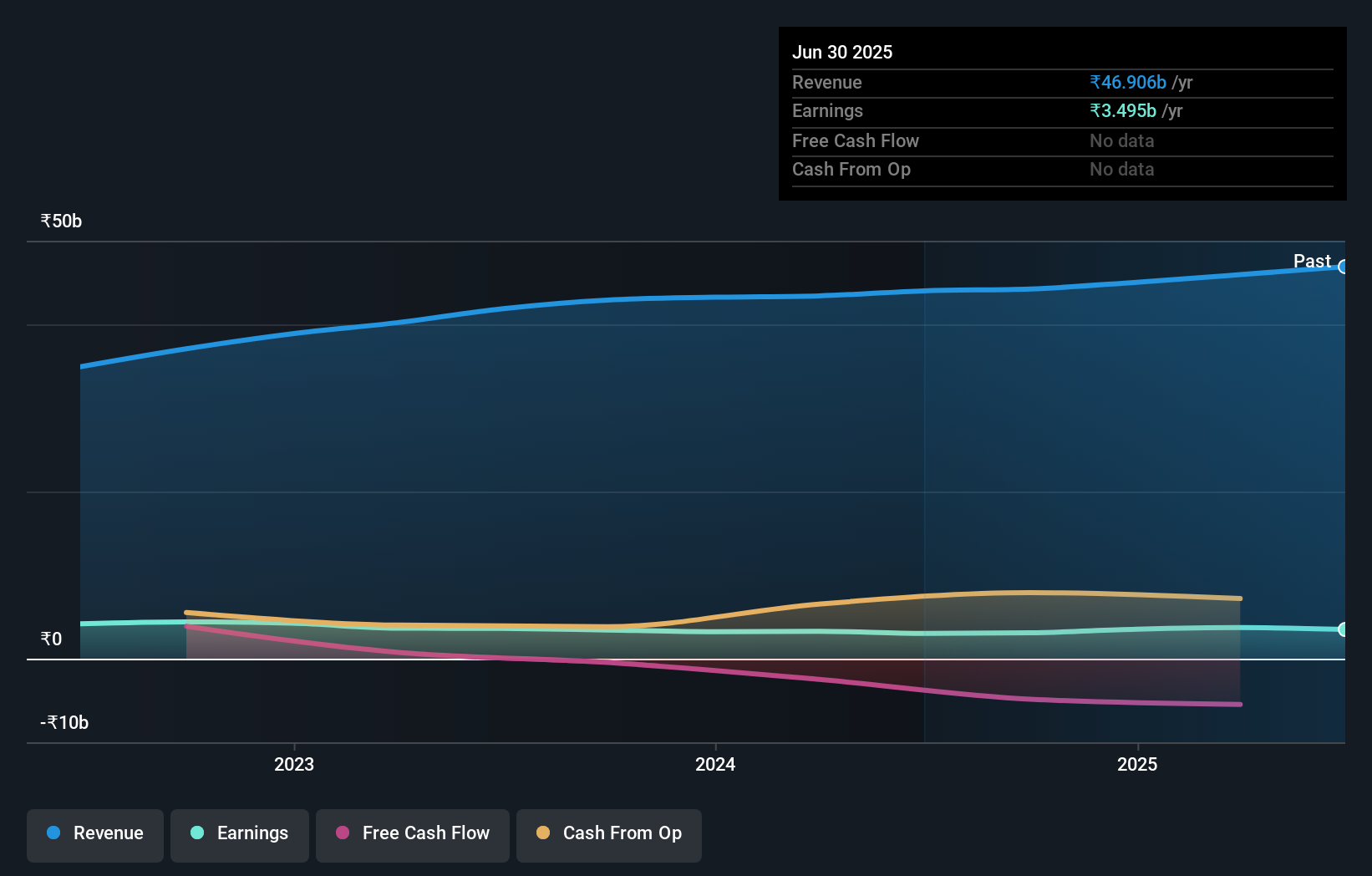- India
- /
- Auto Components
- /
- NSEI:ASAHIINDIA
Asahi India Glass Limited's (NSE:ASAHIINDIA) top owners are public companies with 32% stake, while 27% is held by insiders
Key Insights
- The considerable ownership by public companies in Asahi India Glass indicates that they collectively have a greater say in management and business strategy
- 55% of the business is held by the top 5 shareholders
- 27% of Asahi India Glass is held by insiders
Every investor in Asahi India Glass Limited (NSE:ASAHIINDIA) should be aware of the most powerful shareholder groups. And the group that holds the biggest piece of the pie are public companies with 32% ownership. That is, the group stands to benefit the most if the stock rises (or lose the most if there is a downturn).
Meanwhile, individual insiders make up 27% of the company’s shareholders. Insiders often own a large chunk of younger, smaller, companies while huge companies tend to have institutions as shareholders.
Let's take a closer look to see what the different types of shareholders can tell us about Asahi India Glass.
View our latest analysis for Asahi India Glass

What Does The Institutional Ownership Tell Us About Asahi India Glass?
Many institutions measure their performance against an index that approximates the local market. So they usually pay more attention to companies that are included in major indices.
Asahi India Glass already has institutions on the share registry. Indeed, they own a respectable stake in the company. This can indicate that the company has a certain degree of credibility in the investment community. However, it is best to be wary of relying on the supposed validation that comes with institutional investors. They too, get it wrong sometimes. It is not uncommon to see a big share price drop if two large institutional investors try to sell out of a stock at the same time. So it is worth checking the past earnings trajectory of Asahi India Glass, (below). Of course, keep in mind that there are other factors to consider, too.

We note that hedge funds don't have a meaningful investment in Asahi India Glass. AGC Inc. is currently the largest shareholder, with 21% of shares outstanding. With 11% and 11% of the shares outstanding respectively, Sanjay Labroo and Suzuki Motor Corporation are the second and third largest shareholders. Sanjay Labroo, who is the second-largest shareholder, also happens to hold the title of Chief Executive Officer.
Our research also brought to light the fact that roughly 55% of the company is controlled by the top 5 shareholders suggesting that these owners wield significant influence on the business.
While studying institutional ownership for a company can add value to your research, it is also a good practice to research analyst recommendations to get a deeper understand of a stock's expected performance. Our information suggests that there isn't any analyst coverage of the stock, so it is probably little known.
Insider Ownership Of Asahi India Glass
The definition of an insider can differ slightly between different countries, but members of the board of directors always count. Company management run the business, but the CEO will answer to the board, even if he or she is a member of it.
Insider ownership is positive when it signals leadership are thinking like the true owners of the company. However, high insider ownership can also give immense power to a small group within the company. This can be negative in some circumstances.
It seems insiders own a significant proportion of Asahi India Glass Limited. It is very interesting to see that insiders have a meaningful ₹66b stake in this ₹243b business. It is good to see this level of investment. You can check here to see if those insiders have been buying recently.
General Public Ownership
The general public-- including retail investors -- own 21% stake in the company, and hence can't easily be ignored. This size of ownership, while considerable, may not be enough to change company policy if the decision is not in sync with other large shareholders.
Private Company Ownership
It seems that Private Companies own 7.2%, of the Asahi India Glass stock. It might be worth looking deeper into this. If related parties, such as insiders, have an interest in one of these private companies, that should be disclosed in the annual report. Private companies may also have a strategic interest in the company.
Public Company Ownership
We can see that public companies hold 32% of the Asahi India Glass shares on issue. It's hard to say for sure but this suggests they have entwined business interests. This might be a strategic stake, so it's worth watching this space for changes in ownership.
Next Steps:
While it is well worth considering the different groups that own a company, there are other factors that are even more important. Case in point: We've spotted 1 warning sign for Asahi India Glass you should be aware of.
Of course this may not be the best stock to buy. Therefore, you may wish to see our free collection of interesting prospects boasting favorable financials.
NB: Figures in this article are calculated using data from the last twelve months, which refer to the 12-month period ending on the last date of the month the financial statement is dated. This may not be consistent with full year annual report figures.
New: Manage All Your Stock Portfolios in One Place
We've created the ultimate portfolio companion for stock investors, and it's free.
• Connect an unlimited number of Portfolios and see your total in one currency
• Be alerted to new Warning Signs or Risks via email or mobile
• Track the Fair Value of your stocks
Have feedback on this article? Concerned about the content? Get in touch with us directly. Alternatively, email editorial-team (at) simplywallst.com.
This article by Simply Wall St is general in nature. We provide commentary based on historical data and analyst forecasts only using an unbiased methodology and our articles are not intended to be financial advice. It does not constitute a recommendation to buy or sell any stock, and does not take account of your objectives, or your financial situation. We aim to bring you long-term focused analysis driven by fundamental data. Note that our analysis may not factor in the latest price-sensitive company announcements or qualitative material. Simply Wall St has no position in any stocks mentioned.
About NSEI:ASAHIINDIA
Asahi India Glass
Manufactures and sells glass products in India and internationally.
Proven track record with adequate balance sheet.
Similar Companies
Market Insights
Community Narratives



